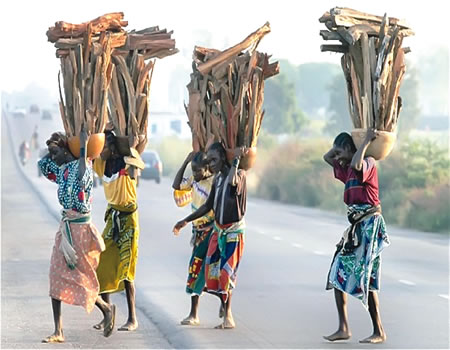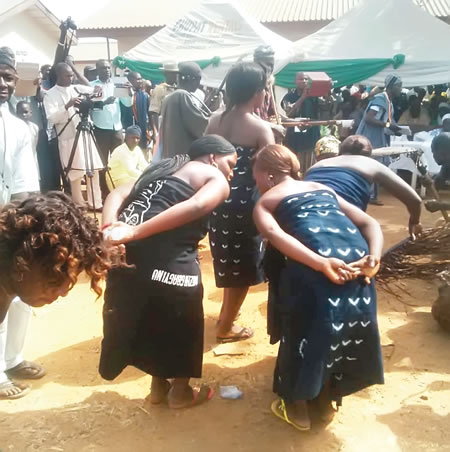Last Thursday, the International Day of the World’s Indigenous Peoples was celebrated around the world and especially at the United Nations Headquarters in New York. This year’s theme is “Indigenous peoples’ migration and movement.”
The celebration was meant to focus on the current situation of indigenous territories, the root causes of migration, trans-border movement and displacement, with a specific focus on indigenous peoples living in urban areas and across international borders.
Through discussions at different forums, attempts were also made to examine the challenges and ways forward to revitalise indigenous peoples’ identities and encourage the protection of their rights in or outside their traditional territories
No other part of Nigeria fits into the focus of this year’s celebrations like the Federal Capital Territory where the Gbagyi people popularly known as Gwari, were forced to relocate from their ancestral land decades back to pave way for the building of a brand new capital for the country.
Since then, it has been more than four decades of struggle for the indigenous people to retain their culture and to have their fundamental rights to govern themselves through their own representatives. For example some of their constant demands have been that the Federal Government should democratise governance in the territory by relinquishing the power to administer the area. Another demand is that Nigeria’s president should stop performing the role of governor of the FCT and that the National Assembly should discontinue to act as the legislature of the territory.
The indigenous people are also requesting that those powers be given to the original inhabitants and residents of the territory so that they can freely and directly elect those to govern them.
The FCT officially became the nation’s capital on December 12, 1991 to replace Lagos. The indigenous inhabitants comprise the Gwari (Gbagyi), Koro, Gwandara, Ganagana, Afo and Bassa ethnic groups. It is divided into six area councils, namely: Abuja Municipal, Gwagwalada, Abaji, Kuje, Bwari and Kwali.
Although, every state has three senators representing it, the FCT has just one and no ministerial representative at the Federal Executive Council (FEC), even when the constitution demands they have.
In celebrating this year’s Indigenous people’s Day, the Coalition of Federal Capital Territory (FCT) Indigenes Associations converged on Brake Resorts in Abuja to speak with one voice, as well as renew their call to the Federal Government to accede to their demands and compensate them.
No compensation
In their separate interviews with Sunday Tribune, the General Coordinator and Secretary General of the coalition, Honourables Kamal Shaibu Adamu and Christopher Dada respectively spoke extensively on the issue of compensation for the indigenous people of the FCT.
They both insisted that no compensation had been paid to any indigene, daring government to go ahead and publish names of the beneficiaries of such compensation.
Speaking further, Adamu lamented that the culture of the indigenous people were dying gradually, hence the need to showcase its values at any given opportunity such as this year’s World Indigenous Day Celebration with a view to preserving it.
According to him, “the government has not compensated us. It is sad because people are being deceived but if government had compensated anyone, it should publish the names and the update.
“Nothing has been done in that regard and the government is not even following the right channel for whatsoever they are claiming to do. We will keep on writing so that people can understand our agitation, but thank God we are still law-abiding citizens.
“A lot of people do not want to believe that this is our land; they want to see FCT as no man’s land, and that is capital NO because most of them went home for holidays, but we don’t go home because we don’t have anywhere else to go to.
«The Federal Government should look inward because we’ve done the needful; we have done what is expected us to do for a nation. Government should look inward and do what should be done for us. We have made a lot of sacrifices which no group of Nigerians has ever done.
“It is not easy to make sacrifices with one’s land, culture and so many things and at the end of the day, one has nothing to show for it. That won’t work again and we will continue telling our children to continue fighting this until what is supposed to be done was done and we are looking for proper leadership that will do the needful for us,” he stressed.
In his own response, Dada said the celebration was meant to seek for sympathy from the Federal Government and other well-meaning Nigerians due to the displacement of his people to make way for the founding of the FCT to the outskirts of Abuja without compensation.
“We are making efforts because we have a valid court judgment now in our favour by the Court of Appeal that one of us initiated, saying that we should be recognised as a state, and an indigene should be appointed to be FCT minister but this has not been implemented.
“We are calling on government to integrate us into the government of the federation so as to be part of decision making and to be relevant in the scheme of things in Nigeria, because we don’t have political offices,” he pleaded.
The Chairman, Abuja Municipal Area Council (AMAC), Alhaji Abdullahi Candido, also acknowledged the peculiar situation being faced by the indigenous people of the FCT he, however, promised to use all available avenues to ensure that whatever belongs to the natives would accrue to them in due course, while promising that President Muhammadu Buhari would address their grievances.
A prominent traditional ruler in the FCT, His Royal Highness, Ona of Abaji and Chairman, Traditional Council of FCT, Alhaji Yunusa Adamu, lamented that a substantial percentage of Abuja indigenes are living in abject poverty.
“We are enveloped by poverty. 99 percent of Abuja indigenes are enveloped by poverty. They can’t do anything on their own. They are beggars. Our children are not going to school because we can’t send them to school. So, please let us try and work together (so that) it will be better for us,” he pleaded with the authorities.
Some other indigenes who spoke with Sunday Tribune all lamented that their people are not well represented in government citing zero ministerial slot, because some other people have taken advantage of the constitutional lacuna. They lamented further that there are structures on ground, regarding the administration of the FCT, but successive governments had ignored its implementation for selfish gains.
They also stated that though the 1999 Constitution, as amended, which provided for the appointment of ministers from the 36 states, did not mention the FCT, but added that section 299 of the same constitution, provides for the appointment of a minister from the FCT, saying “some people had been taking advantage of the provisions to add more ministers to their state, so they bring extra ministers to impose themselves on us.”
The story of the indigenous people of Abuja has been a story of sacrifice for the nation to have a brand new capital city which is now the pride of the nation. The people are have been asking that their sacrifice be recognised by according them the recognition of their rights to adequate representation within the federation called Nigeria. Only time would tell if the sacrifice would not have been in vain.







